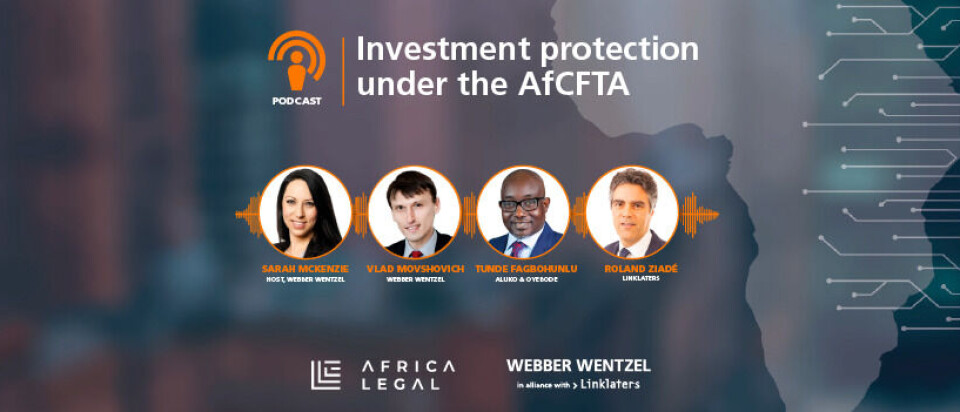Hosted by Webbers’ Sarah McKenzie it features lawyers Vlad Movshovich (Webber Wentzel), Tunde Fagbohunlu (Aluko and Oyebode) and Roland Ziadé (Linklaters). In this summary, James Mayer reflects on their discussion.
The lawyers agree that, before taking the leap and investing in a foreign state, investors need to know how their investment will be treated. This question has become more relevant than ever as the investment protection regime under the AfCFTA is presently being negotiated. While many unknowns still exist, discussion continues over what this new protocol might look like.
The now well known parameters of phase one of the AfCFTA, are seeking to establish the free trade of goods and services. The less well known, but important phase two, aims to specifically address foreign direct investment (FDI) and intra-African investment through the establishment of an investment protocol.
As with so many legislative and regulatory initiatives at this time, progress cannot be spoken about without mention of the delays brought on by the pandemic. The negotiations for phase two are now on hold but expected to take place by 2022.
Vlad Movshovich, partner at Webber Wentzel, says, “The critical components of the investment protocol will include sufficient investor protections while, at the same time, putting adequate responsibilities on investors to ensure there is balance in meeting the Sustainable Development Goals (SDGs) set by the African Union 2063 Agenda.”
In 2008, the African Union mandated various committees to come up with a comprehensive code on investment which took shape over a number of years. This process has leveraged lessons, both positive and negative, from other codes globally. Some codes, such as those developed in the West, were seen by African policy-makers to be imposed on developing countries and are now seen as cautionary examples.
From these lessons, a motivation to provide balance has arisen – between substantive protections for intra-African investment and the need for states to have sufficient policy space to regulate their own social development processes.
So, how will the investment protocol interact with existing investment protection regimes on the continent?
“There are currently 190 intra-African bilateral treaties and investment agreements, though many of them have not yet entered into force. It is unclear if the investment protocol will coexist with others or if it will replace or supersede anything,” says Roland Ziadé, Global Co-Head of International Arbitration at Linklaters.
Ziadé describes a few potential options for the form of the protocol, saying “they might replace the existing African bilateral investment treaties (BIT) to streamline the framework of investment protection in the continent, but this would require significant political commitment. This could say other African BITs don’t apply and would be replaced by the protocol. We have seen this with the EU treatment with third parties – such as with Canada.”
To Listen to the full Podcast - Click HERE.
To join Africa Legal's mailing list please click here

